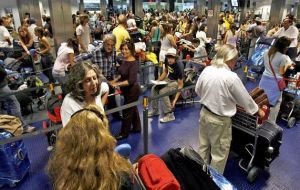MercoPress. South Atlantic News Agency
Argentina extends dollar purchase control to residents travelling abroad
 Travelers must fill a form with their fiscal pin and state destination, purpose and where did they get the dollars for the trip
Travelers must fill a form with their fiscal pin and state destination, purpose and where did they get the dollars for the trip Argentina announced on Thursday the use of a new computer tool to gather information from buyers of holiday packages from travel agencies, in another attempt to control savers thirst for greenbacks after the government's crackdown on access to dollars.
The measure officially confirmed by resolution 3333 published in the Official Gazette empowers the Tax Revenue Office, AFIP, indicates that Argentines who need foreign currency to travel abroad or buy holiday packages through travel agencies will have to fill a form with the fiscal ID pin.
The form demands travellers to detail information on the country/countries of destination, dates of the trip, motives and even if the payment was cash or in instalments.
“The data will enable us to know in detail the matrix of the tourism operators business and this way match fiscal responsibility with effective tax payments by the main contributors of the industry”, said AFIP chief Ricardo Echegaray
Currently tourism operators have access to the formal US dollars market and there have been operations when trips are cancelled or contracted and later returned with the purpose of having access to the ‘cheap’ dollars.
Resolution is extensive to all those wishing to purchase foreign currency to face overseas health costs, tourism and even trips abroad for conferences, congresses, business and/or overseas studies or scholarships.
The decision coincides with an intense display of control operations in money exchange houses, black market trading and the financial district of Buenos Aires to avoid the price of the greenback ballooning in the parallel market following some deals at 7 pesos to the dollar when the official rate (but unattainable) stands at 4.48 Pesos
The gap between the official and parallel or ‘blue’ dollar surged given the uncertainty about the Argentine economy, the global environment and the tough domestic controls on US dollar trading, the natural refuge for Argentine fearful investors.
According to the Buenos Aires media the parallel market for the US dollar trades daily approximately 20 million dollars equivalent to 17% of the overall turnover in the official market, in the range of 350 million dollars.
On Thursday the official rate ended at 4.47 and 4.49 Pesos to the greenback while the ‘blue’ or parallel market dollar slipped 22 cents from 6.15 on Wednesday to 5.93 Pesos.
Argentine banks lost more than 500 million dollars in foreign currency deposits last week, according to the Central bank. About 3.5 billion in foreign currency deposits, mainly US dollars, have left the banking system since President Cristina Fernandez imposed the exchange controls in late October.
Deposit outflows resumed in force this month after stabilizing at about 13.3 billion dollars in the first part of the year. Foreign currency deposits fell to 12.57bn on May 18, after 518 million left the banking system that week, according to a Central bank report.




Top Comments
Disclaimer & comment rules-

-

-

Read all commentsAnd there, ladies and gentlemen, is the surest sign of a country teetering on the brink of a financial abyss that will even make Argentina's previous economic difficulties look like a pleasant walk in the park.
May 25th, 2012 - 07:22 am 0Give it another few years and Argentina will be begging to become a part of the booming Falklands .. and they will of course, quite rightly, be told to “jog on” :)
Lol just had to laugh reading this article after malvinabates comments on the UK recession article, about the UK being finished.
May 25th, 2012 - 08:25 am 0@1 i think it will be much sooner then in a few years, probably in the next 12 months. You only have to look at their decreased growth this year compared to the same periods last year to see the bubble has popped and is leaking air rapidly.
This article just proves they are getting even more desperate to keep money in the country, which means they haven't enough money to support their economy.
Is it 1984 all over again?
May 25th, 2012 - 09:14 am 0Commenting for this story is now closed.
If you have a Facebook account, become a fan and comment on our Facebook Page!